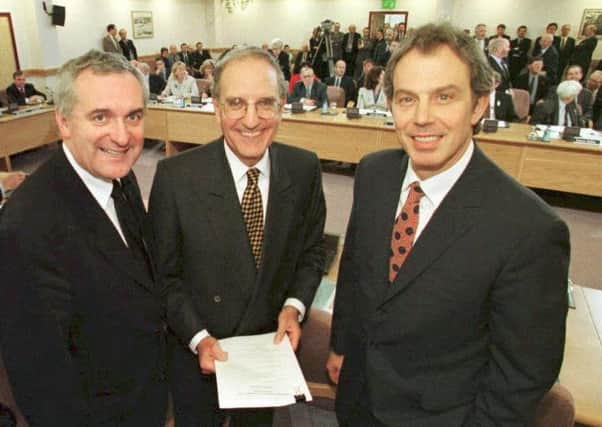Peter Robinson: The Good Friday Agreement was a '˜wretched failure'


Before the Belfast Agreement participants spend too much time polishing their halos for their “great achievement”, it might be worth reminding ourselves that it was a flop and failure that collapsed three times before it was dissolved after its fourth fall.
It was a career-ending disaster for the then First Minister who showed great political courage but poor political judgement; it also marked the point of decline for both the Ulster Unionist Party and the SDLP and proved terminal for their role as significant or serious political entities.
Advertisement
Hide AdAdvertisement
Hide AdThe deficiencies of the agreement, also know as the Good Friday Agreement, placed unionists at a disadvantage and allowed republicans to enter government with their terrorist structures intact; still holding on to their weapons and refusing to recognise the police and courts.
It was neither the start nor the finish of either the peace process or the political process and while unquestionably it was a significant event – worth marking but not celebrating – it seems it is only regarded as seminal because of the personal capital that so many well-placed, and no doubt well-meaning, individuals invested in its construction.
Obviously Northern Ireland needed a settlement. It just didn’t need one that was lop-sided, unstable and short-lived.
The Belfast Agreement had within it the seeds of its own destruction. It was not just the unbalanced elements of the agreement that led to its demise but the crafting of its text allowed it to be construed to suit a variety of outlooks and suggest a variety of outcomes. I accept that every deal needs a little fudge to make it palatable to the taste and sensitivities of a range of signatories but this one was crammed with commercial quantities of the product.
The so-called “constructive ambiguities” meant that each party had an entirely separate interpretation of what had been agreed and very different expectations of the intended outcomes. It was destined to unravel in acrimony.
Every significant democratic political party will house a diverse membership who can hold a range of views on issues while holding key principles in common. The DUP’s membership in the period of the Belfast Agreement negotiations united around opposition to the deal, but like every other party that collective position disguised the range of opinions held on related issues.
In the DUP, there were those who could not stomach any deal that involved Sinn Fein under any circumstances. At the same time there were many more who were prepared to consider an agreement if the republican movement demonstrated it accepted and would adhere to a number of key democratic requirements.
That division within the DUP became apparent when the party reached terms with Sinn Fein following the St Andrews Agreement, but in 1998 all could comfortably unite in opposition to what was a bad deal for unionism.
Advertisement
Hide AdAdvertisement
Hide AdSo while resolutely opposed to the overall balance and indeed some of the features of the Belfast Agreement, the bulk of the DUP accepted many of its underlying principles. While it is apparent that the wretched failure of the Belfast Agreement to deliver for unionists led to the elevation of the DUP, it also presented the DUP with the difficult task of stripping out from under nationalists the concessions they had gained and left the DUP having to come to terms with the reality that some of the ground conceded in the Belfast Agreement would never be regained.
However, it could equally and fairly be argued that the many negative aspects of the Good Friday Agreement made it much easier and possible for the DUP, after they had improved and negotiated a fair and better deal, to sell it to the unionist community.
I appreciate that many who appear to be positive about the Belfast Agreement are more widely and generally manifesting support for the worthy and laudable objective of seeking a negotiated cross-community compromise, rather than specifically supporting the ill-fated 1998 deal. I get that, indeed I too endorse that broader commendable objective.
So, for many of us who in 1998 or later opposed the Belfast Agreement, this casual act of conferring honour and admiration on a failed and rejected agreement is not only an absurdity but excludes and ignores the vast majority of the unionist community who would otherwise join a united community chorus, expressing support for a broader peace and reconciliation objective which is democratically negotiated and delivers a shared and peaceful society.
Now, perhaps more than at any period in recent years, we should focus on resolving the problems of today rather than raking through the entrails of dead deals.
For centuries we have been brought up – no matter which tradition we hail from – to weigh every political decision as either a victory or a defeat. Happily the ways of modern day politics are changing. Compromise is no longer regarded as something to be avoided or worse a betrayal. An honourable compromise is a sound basis for creating a stable society.
However, to be honourable the compromise must be fair, balanced and capable of delivering durable and stable progress.
The Belfast Agreement fell short on each and every one of those imperatives. The St Andrews Agreement passed that test and stood for a decade.
Advertisement
Hide AdAdvertisement
Hide AdThe present impasse is about policy disputes rather than the structures of the agreement, so let us preserve that which works and resolve or manage the issues that divide us.
Peter Robinson, a former First Minister of Northern Ireland, was deputy leader of the DUP at the time of the Good Friday Agreement
